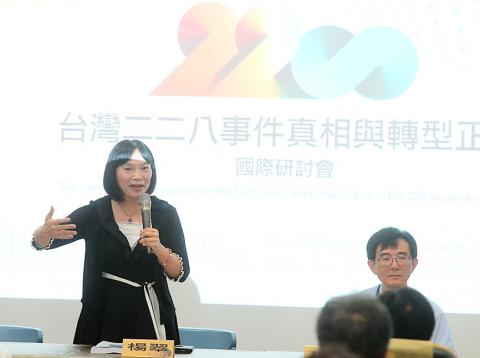The Transitional Justice Commission has gained access to the National Security Bureau’s secret files on 21 cases from the White Terror era, including files on independence advocates Lin I-hsiung (林義雄) and Chen Wen-chen (陳文成).
Commission Acting Chairwoman Yang Tsui (楊翠) said at an international conference on transitional justice in Taipei yesterday that the commission has reviewed the files and would commence interviews with people linked to the incidents.
More than 2,000 documents have been reviewed and new historical facts are being uncovered, she said.

Photo: Wang Yi-sung, Taipei Times
On Feb. 28, 1980, Lin was being tried for treason at a military tribunal, when his mother and two seven-year-old twin daughters were stabbed to death at their home.
Chen’s body was found on the campus of National Taiwan University on July 3, 1981, a day after the now-defunct Taiwan Garrison Command claimed to have released him from custody.
No further details would be disclosed for now to avoid compromising the investigations, she said.
Asked about the pace of the commission’s work, Yang said it is following up on multiple leads, but that officials must proceed carefully so that the commission’s findings would be reliable and able to survive legal challenges.
The commission is holding discussions with academics and experts as it prepares long-term plans that it intends to present to the government in May next year, as it does not expect to complete its mission in the allotted two years, she said.
South Korea in 1996 passed a law to investigate government atrocities in the 1980 Gwangju Uprising and its Ministry of National Defense has only recently organized an investigative body, she said, before calling on the public to be patient about transitional justice.
228 Memorial Foundation chairman Hsueh Hua-yuan (薛化元) said that the foundation is drafting a report on Taiwan’s transitional justice project and would submit it for the commission’s consideration later this year.
An English-language translation of the report is expected to be published some time next year, Hsueh added.

ACTION PLAN: Taiwan would expand procurement from the US and encourage more companies to invest in the US to deepen bilateral cooperation, Lai said The government would not impose reciprocal tariffs in retaliation against US levies, President William Lai (賴清德) said yesterday, as he announced five strategies to address the issue, including pledging to increase Taiwanese companies’ investments in the US. Lai has in the past few days met with administrative and national security officials, as well as representatives from various industries, to explore countermeasures after US President Donald Trump on Wednesday last week announced a 32 percent duty on Taiwanese imports. In a video released yesterday evening, Lai said that Taiwan would not retaliate against the US with higher tariffs and Taiwanese companies’ commitments to

Intelligence agents have recorded 510,000 instances of “controversial information” being spread online by the Chinese Communist Party (CCP) so far this year, the National Security Bureau (NSB) said in a report yesterday, as it warned of artificial intelligence (AI) being employed to generate destabilizing misinformation. The bureau submitted a written report to the Legislative Yuan in preparation for National Security Bureau Director-General Tsai Ming-yen’s (蔡明彥) appearance before the Foreign Affairs and National Defense Committee today. The CCP has been using cognitive warfare to divide Taiwanese society by commenting on controversial issues such as Taiwan Semiconductor Manufacturing Co’s (TSMC, 台積電) investments in the

HELPING HAND: The steering committee of the National Stabilization Fund is expected to hold a meeting to discuss how and when to utilize the fund to help buffer the sell-off The TAIEX plunged 2,065.87 points, or 9.7 percent, to close at 19,232.35 yesterday, the highest single-day percentage loss on record, as investors braced for US President Donald Trump’s tariffs after an extended holiday weekend. Amid the pessimistic atmosphere, 945 listed companies led by large-cap stocks — including Taiwan Semiconductor Manufacturing Co (TSMC, 台積電), Hon Hai Precision Industry Co (鴻海精密) and Largan Precision Co (大立光) — fell by the daily maximum of 10 percent at the close, Taiwan Stock Exchange data showed. The number of listed companies ending limit-down set a new record, the exchange said. The TAIEX plunged by daily maxiumu in just

‘COMPREHENSIVE PLAN’: Lin Chia-lung said that the government was ready to talk about a variety of issues, including investment in and purchases from the US The National Stabilization Fund (NSF) yesterday announced that it would step in to staunch stock market losses for the ninth time in the nation’s history. An NSF board meeting, originally scheduled for Monday next week, was moved to yesterday after stocks plummeted in the wake of US President Donald Trump’s announcement of 32 percent tariffs on Taiwan on Wednesday last week. Board members voted to support the stock market with the NT$500 billion (US$15.15 billion) fund, with injections of funds to begin as soon as today. The NSF in 2000 injected NT$120 billion to stabilize stocks, the most ever. The lowest amount it